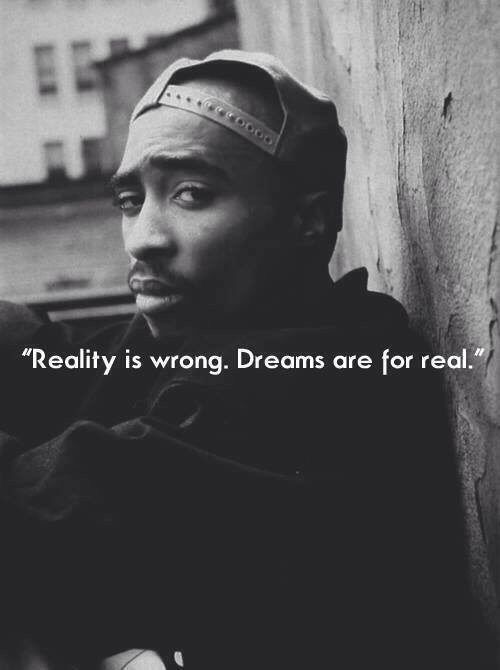
Tupac Shakur’s Vision “Reality is wrong. Dreams are for real.”
When Tupac Shakur, one of the most influential artists of his generation, said, “Reality is wrong. Dreams are for real,” he wasn’t merely stringing together a set of poetic words. He was putting forward a philosophy, one that resonated deeply with millions of his fans and continues to inspire thinkers and dreamers around the world.
1. The Dichotomy of Reality and Dreams
To truly understand the weight of this quote, it’s essential to dissect the dichotomy between reality and dreams. Reality, as we experience it, is full of restrictions, boundaries, and often disappointments. These limitations aren’t just physical; they’re socio-economic, political, and even emotional.
On the contrary, dreams are a realm where boundaries melt away. In dreams, we can fly, create worlds, rewrite our stories, and relive moments we cherish. Dreams are a manifestation of our subconscious desires and hopes, and they’re untainted by the real-world constraints.
“The more I believe, the more the dream will be mine.” – Michael Jackson (check this blog)
You may also like
- The Pillar of Potential: 9 Best Ways to Nurture Self-Belief
- 11 Things Mentally Strong People Do
- The Power of Positive Affirmations: How To Shape Your Mindset
- Yoga for Beginners: Exactly Postures, Tips, and Benefits
2. The Power of Aspirations
Tupac’s perspective also touches upon the significance of our aspirations. While reality can be harsh, dreams embody our purest desires and the loftiest goals we want to achieve. They serve as a beacon, guiding us through the challenging terrain of life. When Tupac suggests dreams are “for real,” he is emphasizing that our aspirations and hopes have tangible power. They can drive change, inspire movements, and transform societies.
3. Challenging The Status Quo
Tupac Shakur’s life and career were all about challenging the status quo. Born in the heart of societal struggles, he often rapped about injustices, inequalities, and dreams of a better world. By stating that “reality is wrong,” Tupac encourages listeners to question the world around them, to challenge accepted norms, and not to take reality at face value.
4. The Healing Power of Dreams
Beyond societal implications, dreams also possess a personal, healing dimension. Many individuals, facing trauma or hardship, often turn to their dreams as a sanctuary. Whether it’s the dream of a brighter future, reuniting with a lost loved one, or merely escaping the trials and tribulations of the day, dreams provide solace. They are the balm for wounds inflicted by a harsh reality.
5. Making Dreams a Reality
Finally, one of the most profound interpretations of Tupac’s words is the idea of turning dreams into reality. If reality is wrong and dreams are true, then it’s up to us to bridge the gap. This bridging is seen in every revolutionary invention, every significant social movement, and every story of personal triumph. These were all born from a dream, a vision of something better, something right.
Conclusion
Tupac Shakur’s “Reality is wrong. Dreams are for real.” isn’t just a quote; it’s a call to action. It reminds us that while the world may be fraught with challenges, it’s our dreams and aspirations that hold the true essence of life. Whether it’s the dream of equality, the vision of a world without poverty, or personal ambitions of success and happiness, it’s these dreams that have the power to reshape reality.
In a world where it’s easy to be bogged down by the weight of the present, Tupac’s words serve as a timely reminder to look beyond, to dream, and to make those dreams a reality.
